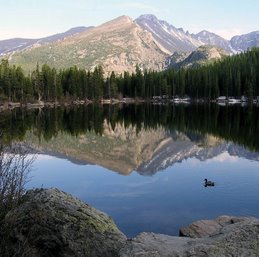Subscribe to:
Post Comments (Atom)
skip to main |
skip to sidebar

Bear Lake, Colorado

About Me
- Louann Reid
- I am a professor of English education at Colorado State University and the past editor of English Journal.
6 comments:
Louann,
Where do you find the time to look over all of this information? find time to blog? and time to teach? As I looked over the information on this link, trying my best to capture what I could during our break from class, I thought about how I am struggling to find enough time to remember to write down the things that I do. Or, to read what I have written down to do. Naturally, I can't take away what I should, or need to, take away from this, but I getting a glimpse at this gives me an idea of what we are getting into in this class of visual texts.
I loved this list. While much of it I've seen or used, I found some really cool new software. Snagit, and Linkedln are amazing. And Google Scholar is a great search engine for academic articles.
I am more curious though, where do you find all of these? I can usually find about anything I want, but I am not having lots of luck finding these kinds of blogs.
I found another link, Edublogs, for educators. Thought others might find it interesting as well.
http://edublogs.org/
Thanks, Louann, for posting Hart's "Top 100 Tools". As I was looking over the alphabetical list of tools, I noticed that literally 15 of them are dedicated (when one includes Gmail as part of Google) to products and services provided by Google. I find it ironic that Google in general is notorious for being such a huge corporation and for their method of listing "hits", but that we still use the company's tools so often that I, for example, would have had a much harder time creating a blog if I wasn't a gmail subscriber. Do you think my thoughts on this irony is founded? I mean the company is enormous and borders on monopolizing information at times (or at least it seems to), but with Google Scholar, Google Earth, etc., I find it to be so convenient I almost feel like I'm cheating when I do a google search and find dozens of entries that, upon critical inspection, are sometimes very credible. For those people who aren't students and don't have access to certain library databases (like Lexis Nexis, Ebsco, etc.), it seems like Google is at least a productive alternative. Yet, in the academy, Google is scoffed and students receive the occasional mild admonishing for even considering using even Google Scholar. Any thoughts?
Thanks for posting so much cool stuff!
J.D.
Hey Louann,
This link was a great way to remind me that when students are producers of various literacies, they learn so much more than just been consumers. While looking through this I was especially reminded of my excitement of trying a wiki or blog in my class as well as the Google Maps. I'm still working through some ideas about using wiki spaces. As far as the Google Maps, I'm thinking it would be a great way to incoporate technology into the identity unit that my student teacher and I will be working on. Thanks again for finding such great information!
I had no idea how many different free software packages we could download. Because I had not head of some of these before, I went to the websites of a few of the more intriguing names, like audacity, looking for what they have to offer. Audacity is a great tool for teachers, and now one that I intend to use. With this tool, we can record and edit sounds. This would be such a fun tool to use with, say, a creative writing class. I could record various sounds, play them for the kids and have them describe what they hear. Or I could post them to my website and have kids log in as a homework assignment and add their descriptions. This is a great list. Thanks for creating a link here, Louann!
Post a Comment